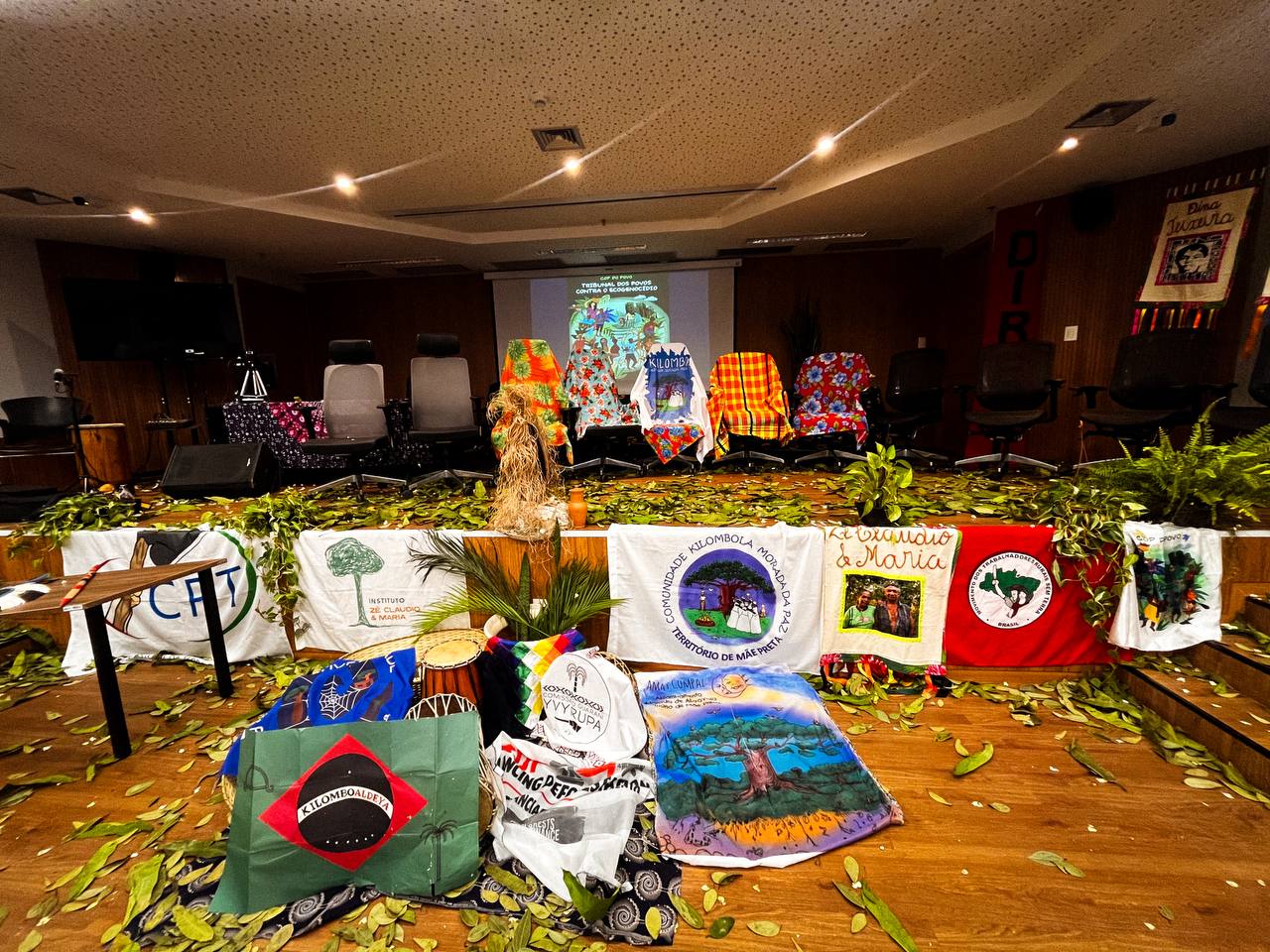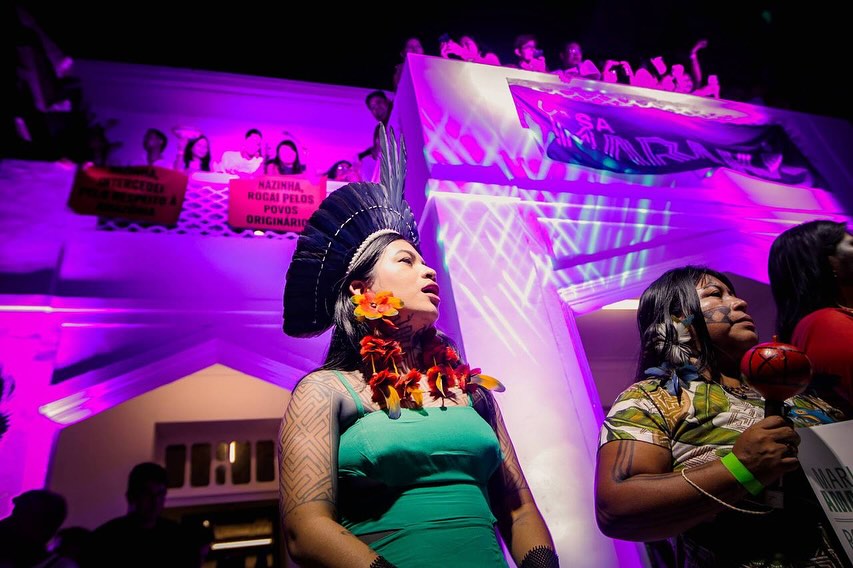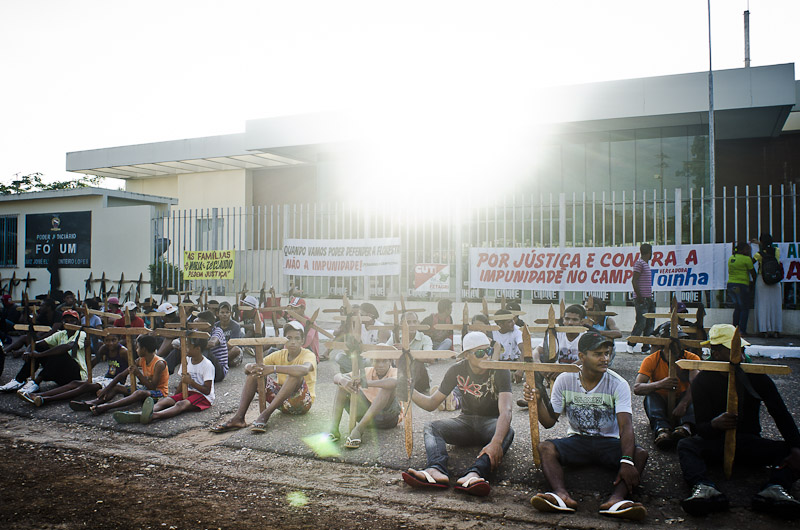
When profit violates territorial rights: Belo Monte in the People’s Court
The expulsion of traditional communities of the Belo Monte Hydroelectric Plant was the first case presented at the event
Joyce Nunes, from NINJA’s Collaborative Coverage at COP30
“In memory of those who did not have justice, of those whose names were not on the lists because they disappeared, of those who were murdered, tortured, and dehumanized. The People’s Tribunal is for all of them.”
With this declaration by the coordinator of the Zé Cláudio and Maria Institute, Claudelice Santos, and under the blessings and protections of a ritual led by various peoples, the People’s Tribunal Against Ecogenocide began.
The event is organized by the Base Organizations for Climate Movement (Movimento Organizações de Base pelo Clima), known as the People’s COP. It takes place parallel to the 30th edition of the United Nations Climate Change Conference (COP-30), held by the United Nations in Belém do Pará in 2025. The initiative’s goal is to be a place for denunciation for the peoples, territories, and communities affected by various cases of rights removal, violation of territories, and often, of life itself. It has no judicial or political power, but great effectiveness in making rights violations visible worldwide.
The first case presented was the expulsion of traditional communities and peoples during the construction of the Belo Monte Hydroelectric Plant, a project that affected about 40,000 people and completed 14 years in 2025. The installation began in 2011 in the city of Altamira, on the Middle Xingu River, with the works finalized in 2021.
The complaint presented by the symbolic prosecutor Eryck Batalha, from the Fogo Cruzado Institute, points to responsibilities of the company Norte Energia, the Belo Monte Construction Consortium, the financing by the National Bank for Economic and Social Development (BNDES), and the Federal Government, represented by the Brazilian Institute of Environment and Renewable Natural Resources (IBAMA).
According to the prosecutor, the company failed to meet the agreed legal demands, even with the commitment established in the project’s Basic Environmental Plan (PBA). The document released by the event’s organization, which details the case, points out that the registration questionnaire developed by the company did not have accessible language for the target audience and that the value of the indemnities did not cover the costs of a new suitable home for the riverside way of life. Furthermore, IBAMA is accused of omission in supervising the compliance with environmental and social agreements, ignoring the application of conditionalities when issuing the licenses for operation.
Mônica Brito is one of the residents impacted by the Plant’s construction and expelled from her territory in 2011. She reports that her departure also involved a process of social isolation, as she was separated from her neighbors and family and, during this period, received judicial mandates that prevented her from circulating in the city of Altamira with people involved in the mobilizations against the hydroelectric plant’s construction. In addition, Mônica points out the increase in violence in the region with the arrival of new residents, highlighting that most of the victims of this scenario were young, poor, black people, who began to live under constant threat. Today, she lives in a rented house and claims not to have received sufficient compensation to buy a home.
“We are really believing in this tribunal, because the result of this tribunal here, of these speeches here, is a product of dignity. That’s what we want: dignity, respect, justice, climate justice, justice for our bodies,” she declared at the end of her testimony.
When the mobilizations shouted: “Stop Belo Monte!”
During the project’s approval period, traditional communities spoke out against the construction, denouncing the impacts the dam would have on their territories, customs, and ways of life. The population’s main concerns were about the consequences of installing a mega-dam on the Xingu River, home to various species, such as migratory fish piracemas and the tracajás, but also about the life of the river itself and the riverside and Indigenous peoples who occupied the regions near it. The population warned about the expulsion of thousands of people for the construction to happen, or, in the case of the 23 affected ethnicities, about the disorderly arrival of new residents and the advance of illegal logging, which was already degrading Indigenous lands in the region.
The mobilizations against the construction went beyond the Altamira region, gaining national repercussion from acts spread throughout Brazil with hundreds of people, in a movement known as “Stop Belo Monte.” The demonstrations gathered traditional communities, various sectors of social movements, environmentalists, researchers, social pastoral groups, and the general population.
“Our fight against the Plant was organized in Belém by the Metropolitan Xingu Vivo para Sempre Committee. We organized acts, street mobilizations, made national calls, and even occupied the Belo Monte construction site, showing the strength of mobilizations that were denouncing this policy of profit over life and which does not, in fact, serve the lives of the Amazon,” reports Belém city councilor Vivi Reis, who began her activism amid the acts against the Plant’s construction.
Despite not managing to prevent the Plant’s implementation, 23 conditionalities were established through extensive mobilizations to reduce the impacts caused by the dam. According to a preliminary document with project provisions made available by IBAMA, the land regularization of all impacted lands, a plan for inspection and surveillance of affected Indigenous territories, the guarantee of access to the reservoir, and compensation for communities removed from the site were among the conditionalities. However, more than a decade after the Plant’s installation, the case reaches the People’s Tribunal as a crime that materialized the tragedy announced by traditional communities and the thousands of people who took to the streets.
Sentence
With 21 cases analyzed, the People’s Tribunal was structured into three thematic axes: False Climate Solutions, Violence in the Countryside, and Large Enterprises.
At the close of activities, a document was delivered, symbolically presented as a “sentence.” This document compiles the complaints presented and offers recommendations for measures to be adopted. The delivery was made to prosecutor Rafael Martins, of the Federal Public Ministry, who will be responsible for providing the necessary follow-up.
Another act carried out during the closing was the transformation of the People’s Tribunal Against Ecogenocide into the Autonomous and Permanent People’s Tribunal Against Genocide, with new editions already planned for 2026, with new cases to be presented.


